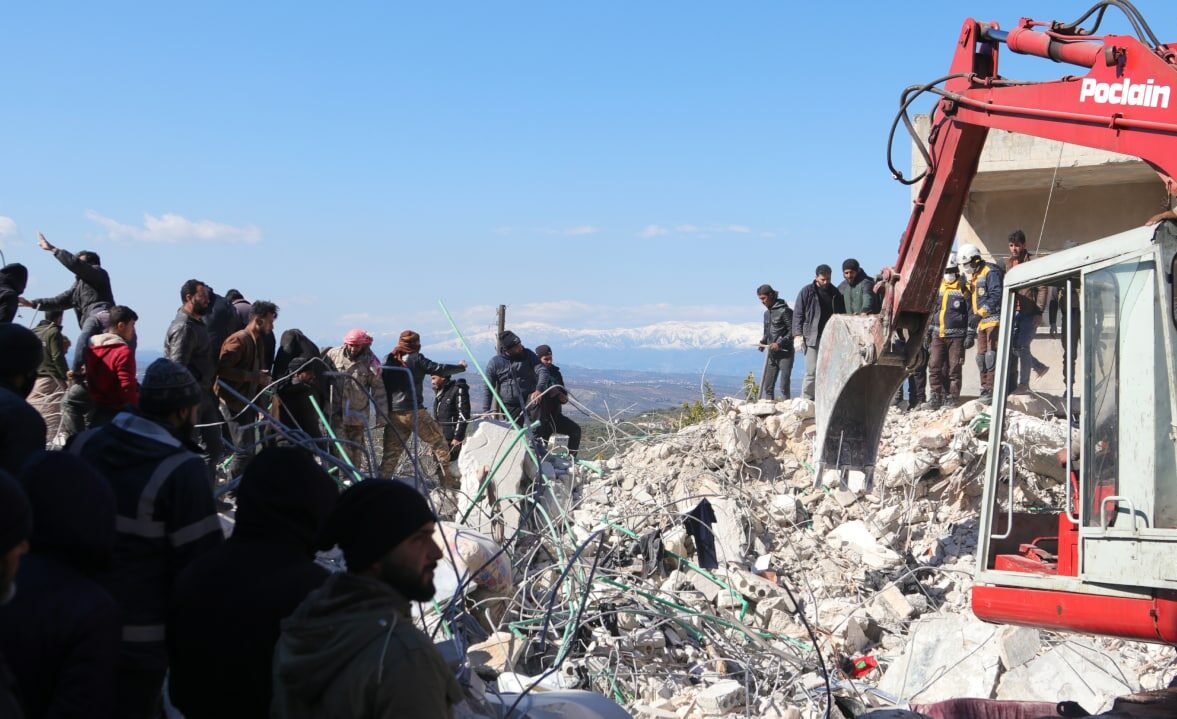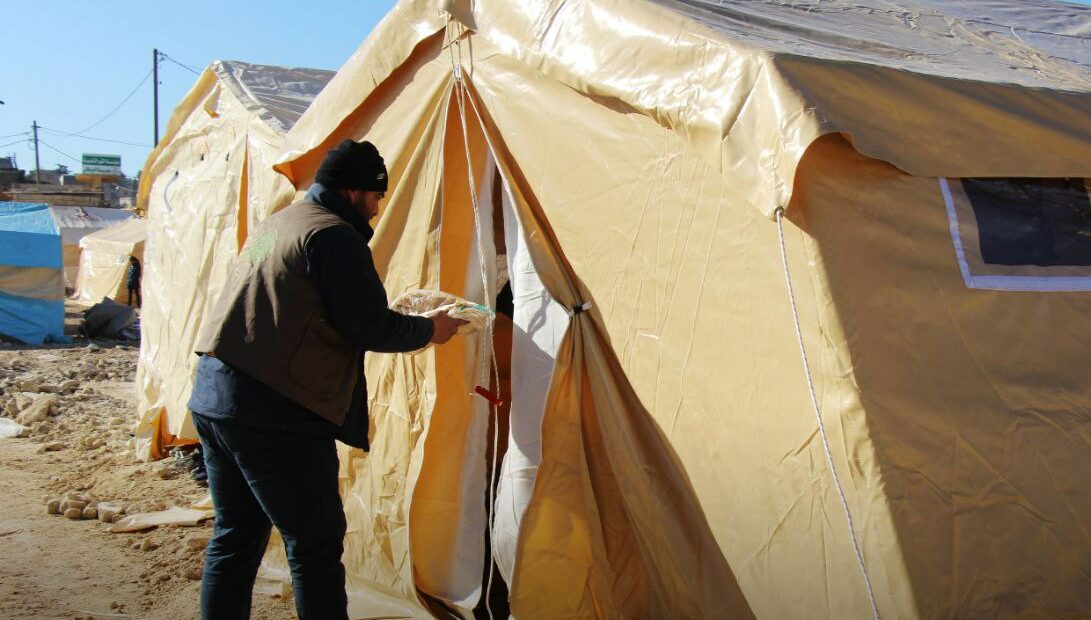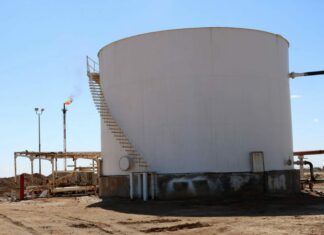
As northern Syria enters its fifth day since the beginning of one of the worst natural disasters in recent history the free people of the liberated areas continue their struggle for survival without much assistance from the outside world or international aid organizations.
“On the morning of Monday, February 6th 2023 a 7.6-degree earthquake struck the Idlib region of Syria, causing extensive human losses and severe damage to residential neighborhoods,” began Abu Muhammad Jolani at a press conference held yesterday. He continued, “according to official statistics nearly 2,000 deaths and 5,000 wounded, as well as the complete destruction of 572 residential buildings, 4,000 buildings are partially demolished, distributed over 56 towns. As a result, more than 30,000 families are affected, in addition to the fate of thousands of families under the rubble, whose fates are still unknown.”
Continued Humanitarian Efforts
Locating and saving survivors is only the first part of the harrowing process, a country already devastated by 12 years of war now finds itself struggling with thousands of people, many women and children who have been made homeless and destitute overnight. The Syrian Salvation Government (SSG) has set up an Emergency Response Committee (ERC) to attend to the thousands of victims of this monumental crisis.
The ERC has sent a convoy from Idlib to the city of Jindires to aid and console the people of one of the most afflicted regions by the earthquake. The Public Safety Committee in the region conducted technical inspections of the damaged homes in the city of Atarib, west of Aleppo, in hopes that many could safely return home.
Four new centers to receive children who lost their families in the earthquake were established in Idlib City, Dana, Deir Hassan, and Darkoush. The centers provide care and shelter for orphaned children or unaccompanied minors until their relatives can be located or placed in homes.
The Directorate of Humanitarian Affairs has continued to distribute meals, and heating materials and expand the network of emergency shelters for the homeless. Administrators from the SSG toured several emergency sheltering centers in Atarib, Dana, Darat Izza, and Bardaqli.
While assistant Minister of Economy and Resources, Professor Ahmed Abdel-Malik assured the people that, “Under the direction of the General Organization for Grain Trade and Processing, all public and private bakeries will continue to work on Friday, to meet the needs of the people in light of the difficult circumstances that northern Syria is going through after the devastating earthquake.”

Flood Threat
Following earthquake damage in neighboring Turkey and siphoning off water from a dam in Assad-controlled areas, the Orontes River overflown flooding several areas in Idlib, five villages in particular, Hardana, al-Toul, Jakarah, al-Hamziyah, and Dalbiya are at risk or flooded, they containing over 680 homes and 7,200 people, most of whom have been evacuated by the ERC to newly created emergency flood shelters.
Engineering brigades from the Al-Fath Al-Mubin operations room alongside Syria Civil Defense teams have been by establishing earthen berms in the village of al-Talul, north of Salqin, to stem the flow of water from the Orontes River into the village.
Amnesty
Due to concerns for their safety and to allow grieving families to unite with incarcerated loved ones the SSG’s Ministry of Justice announced its second amnesty since the tragic earthquake struck. Judge Shadi Al-Wisi, told the press, “In response to the earthquake requests of our bereaved families to consider clemency, today we released the second batch of convicts whose liabilities are related to financial reprimands, and their number reached 125 inmates.”
Too Little too Late …
Thursday, several Syrian activists and media professionals organized protests at the Bab al-Hawa border crossing and in the ruins of the village of Bisniya, south of Harem, demanding assistance for the people affected by the Syrian earthquake.
There are shortages of vital rescue equipment, medical supplies, and specialized teams which may have resulted in the loss of lives. The protesters raised banners calling on the UN, human rights organizations, and the international community to provide relief to the afflicted families and provide urgent relief to the hundreds of thousands of civilians who were injured, displaced and as a result of the earthquake, many of whom have lost all of their savings and belongings for the second or third time in less than a decade.
A convoy of six trucks bearing UN aid entered Syria Thursday, the White Helmets, Syria Civil Defense (SCD) explains, “the UN aid that [entered] northwestern Syria is the regular and periodic assistance that has been occurring since before the earthquake. It stopped during the first days of the earthquake and has now resumed. It is not special aid and equipment for the search and rescue teams and the recovery of those trapped under the rubble. We are disappointed at a time when we are desperate for equipment that will help us save lives from under the rubble.”
An Egyptian rescue team consisting of four doctors and 17 search and rescue members entered the city of Jindires on Wednesday and a Spanish team also joined in the search and rescue efforts yet no other teams or earthquake assistance has been received in disaster-ridden northern Syria.
Despite the slow start several trucks have begun crossing into Syria Friday, 28 tankers with gasoline, four with diesel, and 21 vehicles from the UN and Turkish Red Crescent carrying foodstuff, flour and medical supplies. It’s hoped that this is only the beginning of the aid and that the recent announcement by the US Department of Treasury of a 180-day moratorium on sanctions for Syrian earthquake relief will encourage more to donate to the liberated territories.
The SCD lamented over the dire situation facing the people due to a lack of adequate support, “Over 90 hours since the devastating earthquake. Thousands were killed and injured and many more are still buried under the rubble. We have reached a critical point. The death toll is expected to sharply rise as those trapped cannot hang in much longer. We need international support.”





